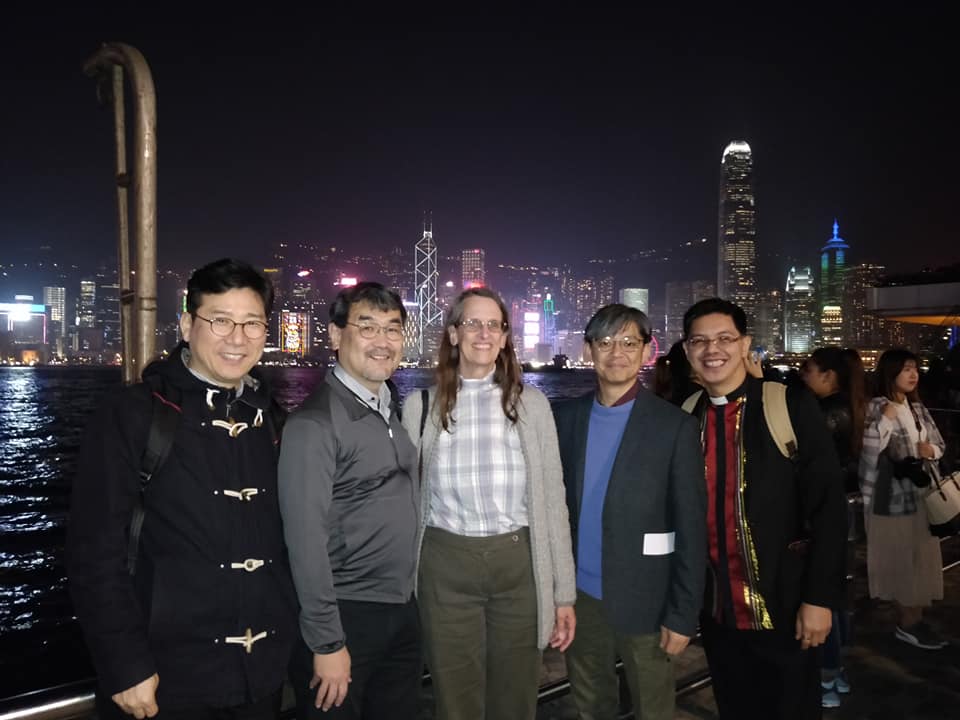Alternate deputy Ruth Meyers of California, a members of the Task Force on Liturgical and Prayer Book Revision, attended the International Anglican Liturgical Consultation in Hong Kong in January 2019. In this essay, she reflects on worshipping and learning with people from across the Anglican Communion:
Gathering in Hong Kong for the International Anglican Liturgical Consultation, with 33 Anglicans from 21 Churches of the Communion, I was struck by both the breadth of the Anglican Communion and our commonalities.
Over the course of the week, we worshiped together using liturgies from seven different churches. Our common prayer had many different inflections, since most churches in the Communion have developed their own prayer book.
Morning Prayer led by participants from Japan included several Taizé chants. The Latin words were familiar to me – “Laudate omnes gentes,” “Confitemini Domino” – but our voices blended with many languages, including Japanese, Korean, and Tagalog. When we came to the intercessions, the leaders had invited participants from several churches to bid these prayers. Again, our prayers rose in many different languages, with a common response sung in Japanese: “Ki-ri-su-to no he-i-wa ga wa-ta-shi ta-chi no ko-ko-ro no su-mi-zu-mi ni ma de yu-ki-wa-ta-ri ma-su yo-o-ni” (“May the peace of Christ prevail in every corner of our hearts”).
Later in the week, the sound was very different as we prayed Morning Prayer from the recently revised prayer book of the Episcopal Church of Brazil. Using inclusive and expansive language was a key principle in their revision process, and we used some of those new texts: “Blessed are you, O God, Father and Mother, through your Son, our brother Jesus Christ, and by the presence of the Divine Ruah, your Spirit of love.” In Portuguese, “Divine Ruah” is feminine (“Ruah Divina”), while “Spirit of love” is masculine (“Espirito de amor”). We sang hymns and canticles to traditional Brazilian tunes, with lyrics provided variously in Portuguese, Spanish, English, and, for one song, Korean.
Every meeting of the International Anglican Liturgical Consultation includes reports from provinces. Liturgical revision continues in many Churches of the Communion. Perhaps most striking is the development of a new prayer book in South Sudan. That province has used the 1662 Book of Common Prayer of the Church of England, translated into Arabic and local dialects. Even as the new country of South Sudan struggled with civil war, leaders of the church were eager to develop a prayer book that reflected their context and needs. “A Modern Service Book” of the Episcopal Church of South Sudan is now in its second draft, and the church anticipates final approval at their next provincial synod.
From the provincial reports, I learned that several churches, not just the church in Brazil, are addressing questions of gendered language for God. The Church in Southern Africa is experimenting with the St. Helena Psalter, and the Anglican Church of Canada is developing an inclusive-language liturgical Psalter, while conversations are also underway in England and Scotland. In many provinces, worship takes place in multiple languages, and several churches are addressing questions of translation. Language is just one aspect of liturgical inculturation; like South Sudan, many churches are developing texts and rites that respond to local and contemporary issues and needs.
The book itself is a complex question. While several churches have or are developing electronic and/or online resources, elsewhere local congregations with more limited resources depend on books. Some churches are considering whether a single book is feasible, given the desire to have multiple liturgical options. In the Philippines, some dioceses prepare pamphlets for different rites that include texts from the province’s Book of Common Prayer along with additional material suitable for their particular context.
Hearing reports from around the Communion in light of my role as a member of the Task Force on Liturgical and Prayer Book Revision, I found myself wondering how our work can best respond to the multiple concerns and contexts of The Episcopal Church. I was also reminded that for Anglicans today, liturgical revision is an ongoing process.
While provincial reports were intriguing, most of the meeting was spent in working groups. Several groups considered questions of liturgical formation, and one group focused on developing liturgical resources that reflect and celebrate the unity of the Anglican Communion. Requested by the Primates’ Task Group, these texts are intended for use at international Anglican gatherings and will also be commended to provinces and member churches.
My working group, on liturgical formation of and for laity, included representatives from six different churches. Though we came from vastly different contexts, each of us recognized a need to provide strong liturgical formation for laity, and each of us acknowledged the challenges of encouraging lay people to participate in educational programs.
The closing Eucharist was celebrated on Thursday, January 24, the eve of the 75th anniversary of the ordination of Florence Li Tim-Oi, the first woman to be ordained a priest in the Anglican Communion. It was delightful to celebrate this occasion in the context where she was ordained, with a presider and preacher from the Hong Kong Sheng Kung Hui.
photo: Meyers with IALC colleagues in Hong Kong


